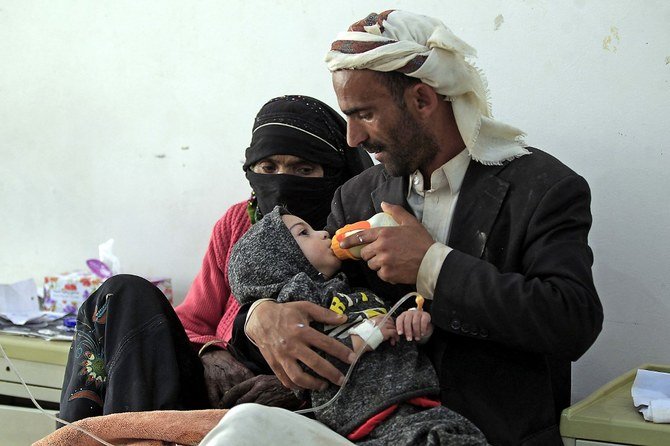LONDON: A controversial reduction in UK overseas aid may not be voted on in Parliament, potentially exposing the government to legal action.
A spokesperson for Prime Minister Boris Johnson refused to comment on whether a cut in the aid budget from 0.7 percent of national income — a precedent established in a 2015 law — would be subject to a vote.
However, the spokesperson claimed that the proposed cut to 0.5 percent of national income was permitted by the law, the 2015 International Development Act.
The reduction in spending was announced by Chancellor of the Exchequer Rishi Sunak, who claimed in last year’s spending review that it was necessary following Britain’s economic battles in the wake of the coronavirus pandemic.
The spokesperson said: “The government is acting compatibly with the International Development Act, which explicitly envisages that there may be a circumstance where the 0.7 percent target is not met.
READ MORE
The UK government is planning to cut its aid programs to some of the world’s poorest countries by as much as two thirds between 2021 and 2022, according to a leaked Foreign & Commonwealth Office (FCO) report. More here.

“We are looking at (a potential vote) carefully, and the foreign secretary will inform the house on how we intend to proceed in due course.”
The UK is the only G7 country to propose cutting its foreign aid budget this year. A leaked Foreign Office report revealed that Britain is considering slashing its aid budget to countries in grave need of assistance, including Lebanon by 88 percent, Syria by 67 percent, Libya by 63 percent and Somalia by 60 percent.
Most notably, cuts to UK aid to war-torn Yemen, which is battling a serious humanitarian crisis, are said to be behind growing opposition to the wider cuts in Parliament.
It would see a decline from £164 million ($233.36 million) to £87 million in urgent aid to the famine-hit country.
The proposal has been slammed by figures including UN Secretary-General Antonio Guterres, who called it a “death sentence for millions of people.”
In a rare intervention, the head of the UN Office for the Coordination of Humanitarian Affairs said the decision means that UK officials have decided to “balance the books on the backs of the starving people of Yemen.”
Last week, Johnson blamed the pandemic for the aid cuts, saying it was the right decision given the “current straitened circumstances.”
Mark Lowcock, former head civil servant at Britain’s Department for International Development, said the aid cut to Yemen would “cause many more deaths” and “damage the international reputation of the UK.”
Should the cut enter the House of Commons for a vote, the government could lose because of a rebellion by MPs. The cut is also likely to face significant pushback in the House of Lords.
But if it is passed without a vote, it could still lead to legal action against the government. Charities and campaign groups would likely seek a judicial review into the legality of the aid cut in relation to the International Development Act.
The act does include concessions in case of adverse economic circumstances, but charities believe the proposals set out by Sunak will fail to meet the conditions to follow through with the cut.
Late last year, Foreign Secretary Dominic Raab said the government had sought legal advice and was told that if the UK did not return to the 0.7 percent norm “in the immediate foreseeable future,” legislation would be required.


























